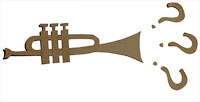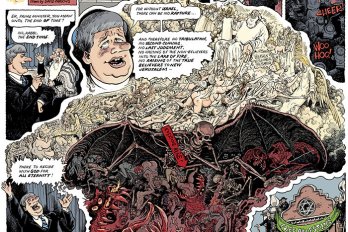What happened on September 11, 2001? Here are a few things that happened: A typhoon packing winds over 110 kilometres an hour tore through Tokyo, killing five. An American spy plane went missing over Iraq. The Heinz food company reported that its corporate profits were up by 6.6 percent, which chairman William R. Johnson credited to “new product successes” such as StarKist pouch tuna and EZ Squirt ketchup. South Korea banned Japanese beef because of fears about mad cow disease. Two Palestinians were killed during an Israeli tank offensive in Jenin. Real Madrid defeated Roma, 2–1. Three days of ethnic conflict in Nigeria climaxed with some 165 dead and 928 wounded. Air Liquide, the world’s leading producer of industrial gases, announced its purchase of Balazs Laboratory Analytical Services as part of an effort, according to Bloomberg Business News, “to broaden its analytical services.” In Michigan, a state court heard an appeal launched by Dr. Jack Kevorkian, who had been charged with second-degree murder after medically facilitating over 130 deaths, by his own admission. Officials in Lithuania outlined steps to intensify a hunt for ninety-seven suspected Nazi collaborators, thirty-nine of whom were believed to be living in the United States.
But, of course, when we talk about “the events of September 11, 2001,” we are invariably talking about one event. And it’s safe to say that in the following ten years that event has become the most discussed, examined, dissected, analyzed, memorialized, and metaphorized in modern memory. It has certainly been the most analyzed one of my lifetime. Had I been born a year earlier, in 1969, I would be inclined to consider the moon landing; or, had I been born a decade earlier, in 1960, the assassination of John F. Kennedy. But despite their obvious historical significance, I don’t think either of those occurrences has been nearly so dissected, discussed, or analyzed, if only because the attacks of September 11 happened just as we were collectively entering an era that was preternaturally inclined toward, and technologically equipped for, dissection, discussion, and analysis.
No Reply
In a metaphorical composition, trumpets mock our search for answers
Jennifer Spinner
In the early 1900s, modernist composer Charles Ives wrote The Unanswered Question, which would later become one of his most popular works. He composed it for strings, flute, and trumpet, and conceived of the piece as a musical metaphor or “cosmic drama.” The strings “are to represent the Silences of the Druids, who Know, See and Hear Nothing,” he specified in his “Note to Performers.” Meanwhile, the trumpet calls ask the “Perennial Question of Existence”; the flutes act as the “Fighting Answerers,” although “after a secret conference” they “seem to realize a futility, and begin to mock The Question.” According to Ives biographer Jan Swafford the composition gets to the heart of the human condition. “Ives makes a philosophical point: a question is better than an answer, in the immensity of creation,” he wrote in an essay, “and those determined to force the answers are apt to look foolish in the face of that immensity.”
—Amirah El-Safty
For example, entire sects have dedicated themselves to proving wild counter-narratives to the official story. As for the rest of us, we gravitate toward more mundane retellings of the day; we personalize the cataclysm so we might better comprehend it. So the initial question “What happened on September 11? ” eventually mutated into the personal question “What were you doing on September 11? ”— which in turn became a kind of cultural trope. We ask it publicly and privately, and declare our answers publicly and privately.
In New York, where I live now but didn’t live then, you commonly encounter people who were at, near, or within sight of the disaster, or who were affected in profoundly personal ways. But even those of us who only witnessed the attacks on TV, in living rooms or bedrooms or newsrooms hundreds or thousands of kilometres away, still recount our personal itineraries to each other, looking for ways to place ourselves in that event like pins on a vast map.
(As for me: On September 11, 2001, I woke up, made coffee, turned on the radio, turned on the television, spent the morning watching the television, and in the evening went to meet a friend for a drink at a bar on King Street, because we had already planned to do that, and though neither of us felt exactly right about it, neither of us could think of a logical reason not to. After all, we were in Toronto. Nothing had happened to us. So we went to the bar, and we ordered beers, and then, like everyone else, we watched the television some more.)
No one should be blamed. We were seeking to share an experience we had not shared, to be a part of something we had not really been a part of, and, in the end, to do what we always try, and usually fail, to do: make some sense of it. Because that, really, was the primal question driving us all along, not “What happened? ” but “What does it mean? ”
If “How does it work? ” was the defining question of the twentieth century and the industrial age, of steam engines and Henry Ford and the atom bomb, then “What does it mean? ” has become, post-9/11, the defining question of the twenty-first century and the Internet age. This is largely because we are now literally hard wired as a planet—congregating globally, electronically, and perpetually—to ask that question again and again and again. The trouble is, we now assume that every event will eventually yield an answer.
For example, ten years later, we are still asking those questions about September 11: “Where were you? ” “What happened? ” “What does it mean? ” Yet, ten years later, it still doesn’t make any sense—or at least no more sense than it should.
This appeared in the October 2011 issue.





